Utah National Guardsmen participate in reaction force training at the North Salt Lake City Armory, May 2, 2021.
Providing up-to-date information, news and original content on American Military issues.
Utah National Guardsmen participate in reaction force training at the North Salt Lake City Armory, May 2, 2021.
Airmen assigned to a Fly Away Security Team conduct training at Camp Riley, Minn., May 15, 2021. FAST members are required to fly on specific missions, to certain locations, to ensure aircraft and crew are protected from hostile fire or onboard security breaches.
Marine Corps Pfc. Hector LuceroLopez works on a medium tactical vehicle replacement at Armed Forces Reserve Oklahoma City, Okla., May 9, 2021.
May 18, 2021 | BY Jim Garamone , DOD News
Royal Air Force Air Chief Marshal Sir Stuart Peach touted NATO's ability to adapt and evolve to stay effective and relevant as a deterrent force.
The chairman of NATO's Military Committee spoke at the beginning of a meeting of alliance chiefs of defense in Brussels, today. Army Gen. Mark A. Milley, the chairman of the Joint Chiefs of Staff, represented the U.S. at the meeting.
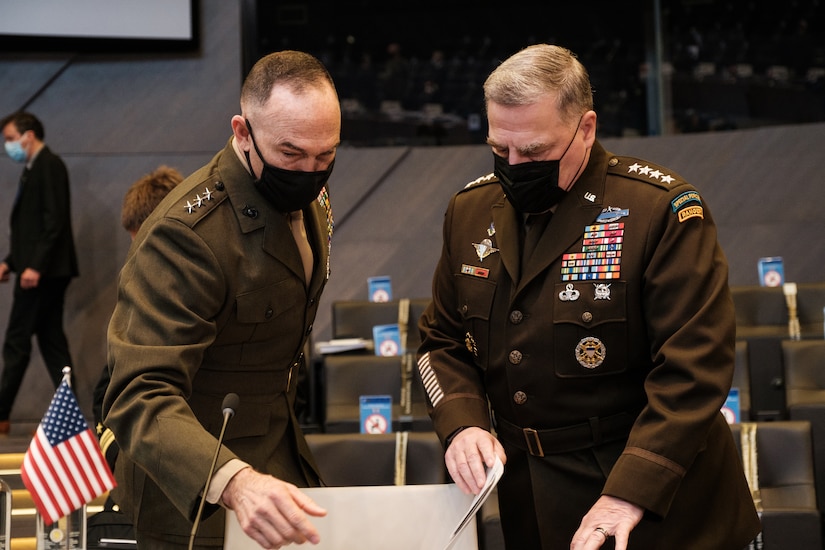
Peach said the discussion focused on NATO 2030, NATO's military strategic planning and adaptation, and NATO-led operations, missions and activities.
The meeting opened with Secretary General Jens Stoltenberg discussing NATO 2030, which is an initiative that focuses on ensuring that the NATO alliance remains ready to face tomorrow's challenges, and alliance heads of state will discuss in Brussels next month. "[Stoltenberg] informed the Military Committee on progress related to NATO 2030 and the main political issues in the lead up to the Summit," Peach said. "The allied chiefs of defense enthusiastically welcomed the NATO 2030 agenda, which underpins the work of NATO's military authorities."
NATO is effective today, he said. "All four points of the compass, across all the domains of land, sea and air and space and cyber, our highly trained, professional and committed service people are prepared for any endeavor," Peach said.

NATO has evolved in response to growing threats. Russia is the main threat in the Euro-Atlantic region, but China — a rising global power — is also making waves. "Since 2014, we have implemented the biggest reinforcement of collective defense in a generation," Peach said. "We have strengthened our military posture from the Baltic to the Black Sea."
The alliance has undertaken a huge program of adaptation with more investments, modern capabilities and an increased readiness of NATO forces, he said.
But the future will be different, and we will face different difficulties. Climate change is already being felt, and the alliance must incorporate the effects of this in any long-term military development, Peach said. "Climate change will impact our lives in many ways, but crucially for the Military Committee, we are focused on how it affects our common security," he said.
The chiefs called for a survey on the impacts and possible consequences of climate change to be completed across the Alliance's national armed forces. "From there, the military authorities can further integrate climate change risks and considerations into NATO's military planning and exercises," Peach said.
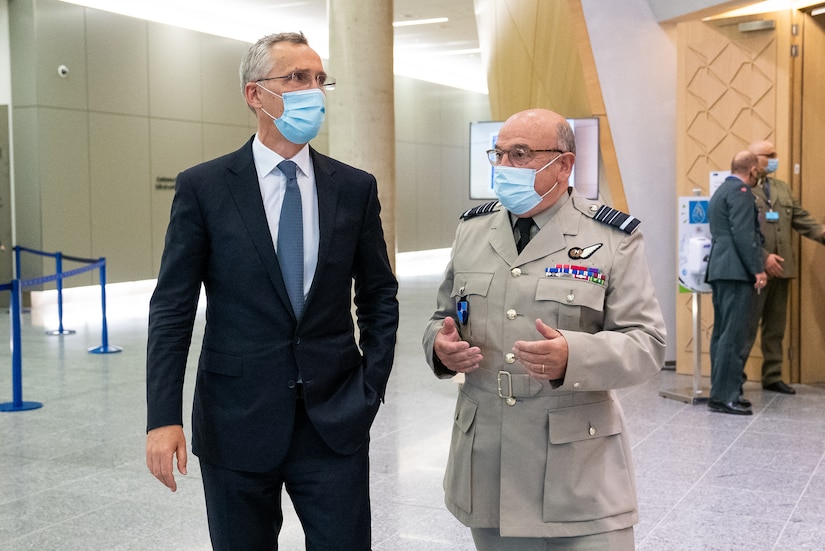
Climate change will affect everything. But there are many threats from other areas. "We see threats and challenges emanating at us [from] many directions," Peach said. "Assertive and rising authoritarian powers, non-state actors and terrorists are challenging the rules-based international order."
Russia is a big problem. Russian President Vladimir Putin continues his program to destabilize the continent, most recently by ordering a large deployment of troops to his nation's border with Ukraine. The movement came with no explanation, and NATO officials called it the largest deployment of Russian forces since the nation's illegal annexation of Crimea in 2014.
"Although we have seen some reduction in the number of Russian troops near the border, tens of thousands remain, including their weapons and equipment," Peach said.
Russian efforts go beyond Eastern Europe. Putin is trying to impose restrictions in the Black Sea, including restricting access to the Sea of Azov through the Kerch Strait. "NATO needs to stay vigilant and preserve our freedom of movement in all relevant seas and airspaces," Peach said.
While the effort against international terrorism has had success, the problem has not disappeared, and NATO nations must gather intelligence, develop capabilities and work with partners to deter this threat.
Other threats to the alliance include malicious cyberattacks, disruptive technologies and nuclear proliferation. "Climate change has implications for security," Peach said. "So, the alliance is responding by adapting and taking action.
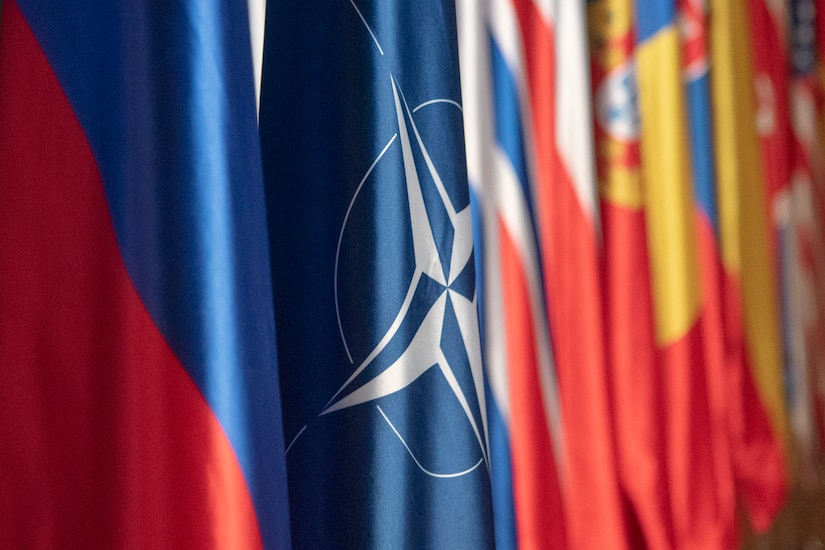
In a nod to the growing threat from China, Peach said alliance nations must strengthen resilience and "reduce the vulnerabilities stemming from foreign ownership, coercion or manipulation."
This is Peach's last Military Committee meeting as chairman. The chiefs elected Dutch Navy Adm. Rob Bauer to become chair of the Military Committee next month. He had been chief of defense of the Netherlands armed forces. Peach has served in the position since June 2018. He has helped cultivate excellent military-to-military relations among the 30 NATO allies and with partner nations to the alliance.
Peach helped shape the discussions on the NATO Military Strategy and with the challenging problems posed by Afghanistan, Iraq, the Islamic State of Iraq and Syria and the Balkans.
Milley presented the Air Chief Marshal with the Legion of Merit — the highest U.S. military award presented to foreign leaders.
A service member jumps out of an Army Chinook helicopter into a reservoir during training at Fort Carson, Co., April 20, 2021.
Air Force Senior Airman Kevin Schwenn brushes freshly poured concrete at Joint Base Langley-Eustis, Va., May 11, 2021.
Navy Petty Officer 3rd Class Tylee Allen conducts maintenance on an MH-60R Seahawk helicopter aboard the USS Paul Ignatius during At-Sea Demo/Formidable Shield in the Atlantic Ocean, May 17, 2021. The exercise is designed to improve interoperability.
The amphibious transport dock ship USS New Orleans is joined by the Royal Australian navy frigate HMAS Parramatta, the French navy amphibious assault helicopter carrier FS Tonnerre, and the Japan Maritime Self-Defense Force landing ship JS Ōsumi in transit during Exercise Jeanne D’Arc off the coast of Kagoshima, Japan, May 14, 2021.
Army Spc. Angelo Guzman, right, and Army Spc. Ryan Salilican, left, combat medics assigned to the 547th Medical Company, 62nd Medical Brigade, prepare to vaccinate a community member at the community vaccination center at State Fair Park in Yakima, Wash., May 10, 2021. U.S. Northern Command, through Army North, remains committed to providing continued, flexible Defense Department support to the Federal Emergency Management Agency as part of the whole-of-government response to COVID-19.
Arizona National Guard Guardsmen helped distribute groceries to area residents at a community food bank in Apache Junction, Ariz., May 17, 2021. More than 850 Arizona National Guardsmen continue to assist at vaccination sites, testing locations and food banks throughout Arizona.
May 18, 2021 | BY SKIP VAUGHN
Diane Otto Watkins wanted to become a professional musician after high school in 1973. She didn't have much money for college, and she didn’t see many opportunities available for women. So she joined the Women's Army Corps.
"My parents told me I had to have a job and medical and dental and a roof over my head and be out of the house," Watkins said.
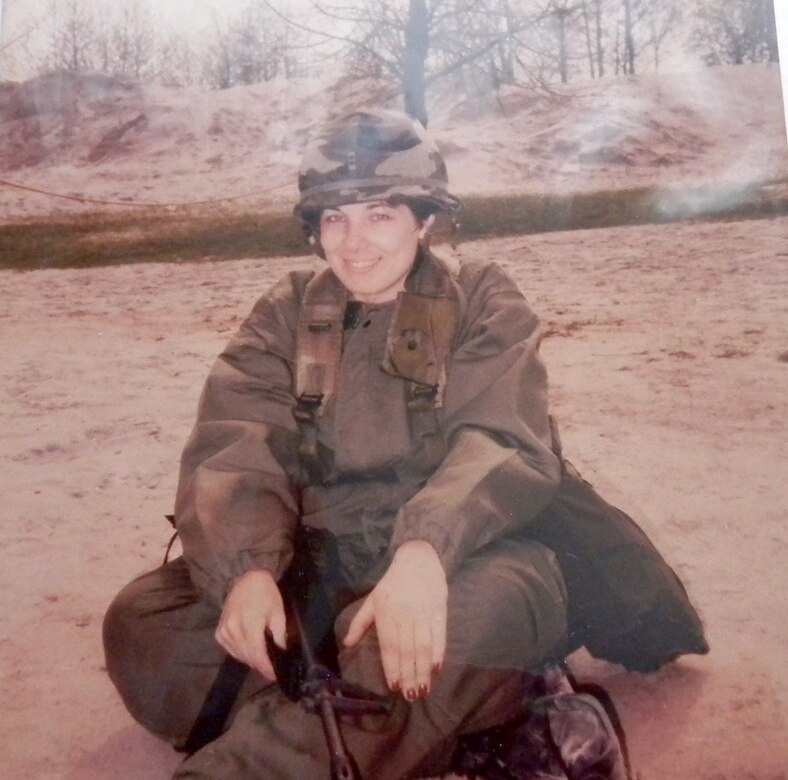
Watkins played clarinet for four years at Cedar Ridge High School in Matawan, New Jersey, During her senior year at Cedar Ridge, she auditioned for the WAC Band in November 1972 at Fort Monmouth. After she graduated from high school in June, she entered the Army on delayed entry at the age of 18.
Watkins went through basic training at Fort McClellan from August to September of 1973. She played clarinet in the all-female 14th Army [WAC] Band from 1973-76 at Fort McClellan, and she also played drums for the marching band. The WAC Band had 72 musicians.
During her years with the Women's Army Corps, she held the ranks of private through specialist four. Her fellow female soldiers called her "Otto,” the nickname from the sergeant's dog in the Beetle Bailey comic strip. "You don't want to know how many cartoons got pasted to my barrack's door," she said laughing.
Her secondary jobs included serving as company clerk, barracks sergeant and heavy truck operator. She had a 5-ton truck license. Whenever the band traveled to a performance, she drove the 5-ton military vehicle.
"When the Women's Army Corps deactivated in 1976, I reenlisted to be in the Military Police Corps," the retired chief warrant officer four said. She retired from the Army in 1994 after 21 years of service. Her last assignment was as a polygraph examiner at Fort Carson, Colorado.
After leaving the WACs, she became a military police officer and was immediately promoted to sergeant in the 111th MP Company at Fort McClellan, Alabama. She was a military officer from 1976-78 and became a criminal investigation division agent from 1978-94. Her career took her to Germany, Washington, D.C., Georgia, Kentucky and Colorado.
"Very productive," Watkins said of her career. "I completed all my education goals. I did all the travel I wanted to do."
She earned an associate degree in criminal justice from the State University of New York in 1979 and a bachelor's in criminology with a minor in psychology from the University of Maryland in 1985. In December 2000, she earned a master's in criminal justice from Armstrong Atlantic State University in Savannah, Georgia. Besides being a Vietnam-era veteran, she is also a Persian Gulf War-era veteran.
Watkins remembers the challenge of being in uniform during the turbulent years of the Vietnam War.
"Travel was difficult because strangers would accost us in the airport. We had to travel in uniform. We had to remove our name tags when we traveled," she said. "People would spit on us in the airports and call us names."
She experienced this while traveling in Atlanta and Newark, New Jersey, in 1973-74. She remembers feeling anxious while marching with the band in a parade in about 1973.
"The crowd on the sideline started to close in on us while we were marching, but nothing happened because the police restored order," she said.
Other than those incidents, she said the band's performances were well-received at high schools and concerts. They were part of the recruiting and morale and welfare efforts.
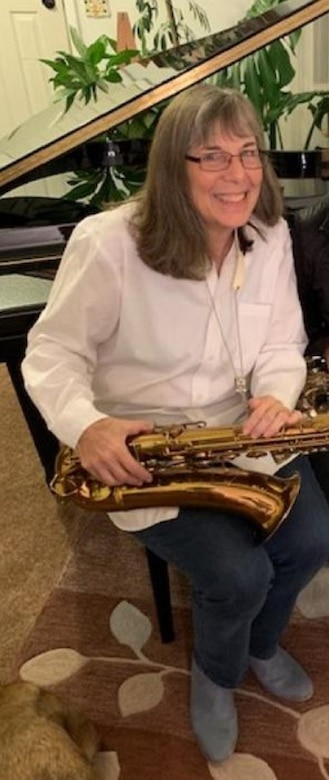
Watkins was raised in South Amboy, New Jersey. She was the second of three children with an older brother and younger sister. Her father, George Otto, was a combat veteran of World War II in Europe with the 101st Airborne Division. Her mother, June, was a registered nurse. Her parents married when George Otto returned from the war.
Watkins' husband of 27 years, Bill Moore, retired in 2001 after 26 years with the Army and Air Force Exchange Service. She has a stepson, a stepdaughter and a grandson. She and her husband have a 40-acre ranch on Bonner Peak in Colorado.
Watkins was part owner and operator of the Star Bar-B-Q in Fort Collins, Colorado, from 2001-06.
Watkins attended the WAC Band reunion in 2018 at Fort McClellan and she plans to return in October 2022. "And we play a reunion concert," she said. "We got the band back together."
Watkins shared her thoughts on being a member of the Women's Army Corps during the Vietnam War.
"It was a means to have a life and get out of poverty and get my education," she said. "If you wanted to be in the military and be a musician, you were going to be a WAC. You had to go in the WAC Band. It was the only option. It was the only branch that had a band that allowed women, so it was pretty special."
She continues to play the clarinet and saxophone and serves as a concertmaster with the Wellington Community Band. She sewed 555 masks from February through November 2020 and donated more than 360 masks to veterans, nurses at nursing homes, family and friends. At 66 she volunteers at Veterans Affairs in Cheyenne, Wyoming, and she is a Colorado master gardener.
(Skip Vaughn is an editor at the Redstone Rocket at Redstone Arsenal in Alabama.)
May 18, 2021 | BY Thomas Brading , Army News Service
By 10th grade, Okera Anyabwile had dropped out of high school and was no stranger to street warfare. His mother's tears didn't stop him from being lured into the crime-driven, fast-cash culture that was 1980s South Central Los Angeles.
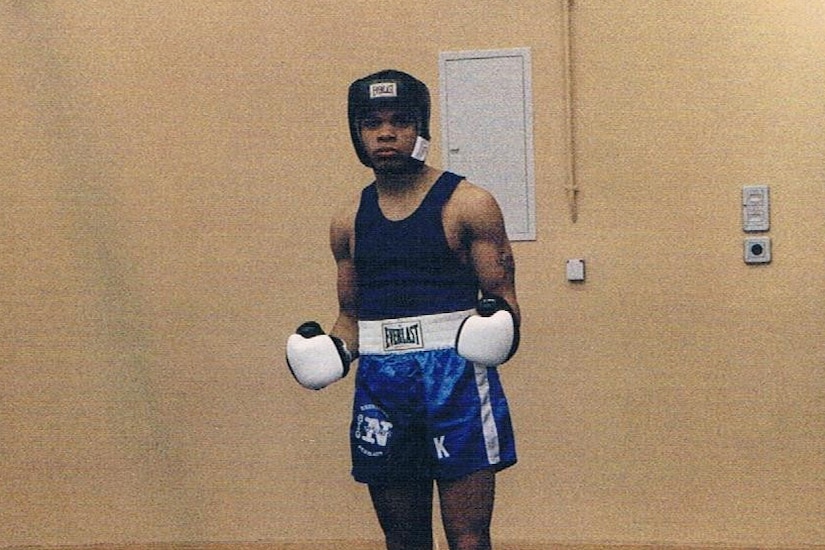
Growing up, he witnessed a spike in drugs and homicides in the "City of Angels" that led to a cycle of violence and countless shootings that claimed the lives of many of his peers.
Before long, Anyabwile found a way out through military service. His 35-year journey in the Army led him from amateur boxing as an enlisted infantryman to recently being promoted to colonel.
None of his success would have been possible without an optimistic Army recruiter who never gave up on him and saved his life, Anyabwile said.
"Without him, I don't know where I'd be today," he said, adding he'd most likely have the same fate as many of his peers: either in prison or 6 feet under.

To better understand Anyabwile's origins, one needs to go decades back to South Central LA.
At the time, violence in the area could be traced to narcotics and unemployment, cutbacks in youth programs, increased use of semiautomatic weapons, and a growing number of street gang members.
For Anyabwile, it was home. He lived in a crowded one-bedroom duplex in the heart of South Central, where along with his three siblings, he was raised by a single mother who worked multiple jobs just to keep food on the table, he said.
South Central was the pulse of a growing Black population and often at odds with its more tourist-friendly, glamourous neighbors of Beverly Hills and Hollywood. Back then, the area was known for all the wrong reasons, he said, particularly the gang violence that was fueled by a growing drug epidemic.
The neighborhood Anyabwile grew up in was ground zero for escalating street violence, which was compounded by young men and women forced to choose between welfare and crime, he said.
At 16, he broke his mother's heart, he said, after dropping out of school.
"She took me to the high school to talk with the principal, but I was adamant about not going back. She just cried. That really hurt, because I knew in her mind she probably saw a short future for me based on what was happening," he said.
The misguided teenager and second oldest of his siblings valued the fast cash he found on the streets over his education. The reason was simple: he felt a duty to help his mom pay the bills. "I ended up doing some things I'm not proud of to help my mom," he said.
Around this time, his 30-something-year-old employer was gunned down in the streets. That death sparked a sense of urgency in the teen.
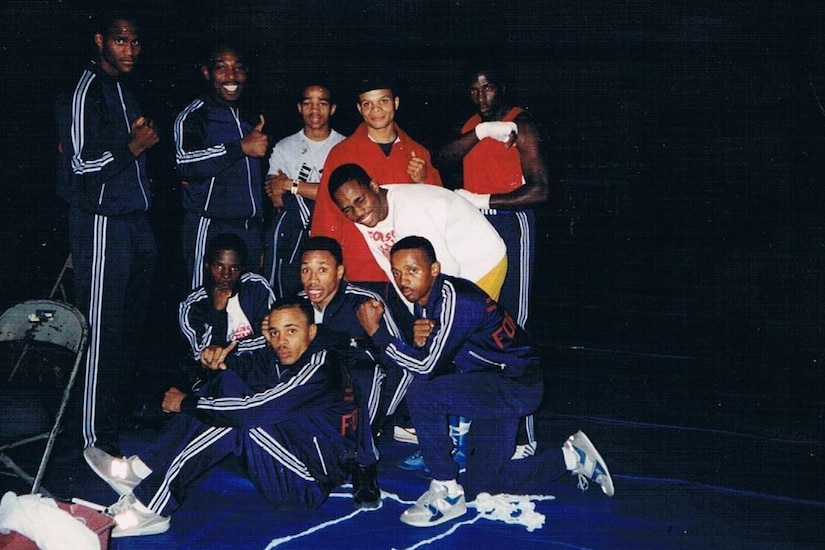
Anyabwile, who was no stranger to being shot at, knew it was only a matter of time before death came knocking, and all of his mother's fears would come true.
"I knew that I needed to make a change in my life and get out of the situation," he said. "So, I went to see an Army recruiter. One of my friends left for the service a few years before, and I remember him coming back and was doing all right, so I thought, 'I'll give this a shot.'"
Anyabwile clicked with his recruiter, Army Sgt. 1st Class Harold Johnson, from the start. The future soldier could see himself in the noncommissioned officer, or at least the version of himself he hoped to become. He also knew Johnson, a young African American male, probably saw himself in the South Central men and women he brought into the Army.
"I can only assume that he wanted to help me have a better future," he said. "With his office being in South Central, I'm certain he knew the circumstances for young African-American males during that time to the mid-80s."
With no arrests or criminal record, it seemed Anyabwile, who was in good physical condition, was a shoo-in for military service. But, there was one problem: he never finished high school. This was a no-go. Without a diploma, Johnson initially had to turn the teenager away from enlisting.
However, this didn't deter Johnson from helping him. After leaving the recruiter’s office feeling deflated, the recruiter called Anyabwile back and pledged to get the young man into the ranks.
To do this, he helped Anyabwile obtain his General Educational Development, or GED, diploma, enroll in night classes, and then earn his high school diploma that eventually allowed Anyabwile to enlist and hop on a bus to basic combat training.
"Maybe he saw part of himself in me," he said, musing over why Johnson went above and beyond to get him off the streets. "It was one of the most pivotal moments in my life."
The decision not only got him on the right track, but helped patch his mother's broken heart. "She rejoiced that I made the decision to go back to school and into the military," he said. "My siblings have been proud of me for making that choice to this very day."
Although his mother died a decade ago, she was able to see her son live life to the fullest as a soldier.
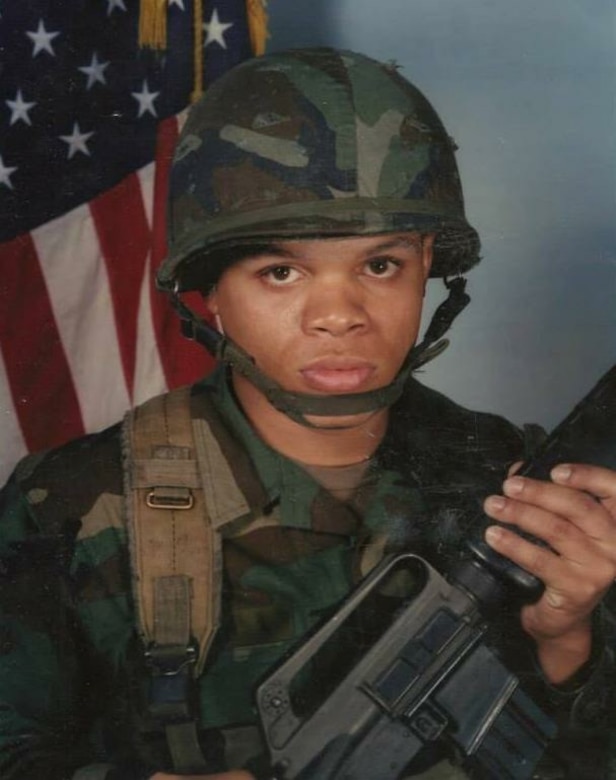
In a lot of ways, Anyabwile's upbringing in South Central prepared him for life in the Army, he said. For example, he was already accustomed to low-flying helicopter noise from either the Los Angeles Police Department, the sheriff's department, or gunshots throughout the night. He felt at home with Army training.
The sound of live rounds echoing all around was also nothing new for a young man raised amid gang violence. Finally, his training as an Army boxer was also an easy transition for someone who grew up in a place where fighting was an everyday part of life, he said.
Shortly after arriving at his first duty station in Germany, Anyabwile found his calling as a boxer after winning a recreation bout with a few days of free leave on the line.
In the past, fighting was about survival and never for fun. Growing up in South Central, he never heard the roar of a crowd or felt the warm glow of spotlights. There were no referees to lift his arm in victory on the streets or bells to start and stop the flurry of fists.
However, the fundamentals of the sport were the same, despite how unpolished his techniques may have been. The unschooled boxer learned he was a natural, he said.
The nuts and bolts of the sport are raw. In the purest sense of the term, boxing is a sport with clear-cut winners and losers. It's about being able to punch someone in the face, which wasn't a new concept, he said, and neither was taking a punch — one often leading to the other.
Winning his first fight in Germany did more than earn him a four-day leave pass, though. It also opened the door to traveling the world fighting for the Army. Over his three-year stint as an Army boxer, Anyabwile collected a series of championships and accolades.
"[Fighting was] just the nature of where I lived," he said. "We had to learn to fight, and it wasn't through the police athletic league."
While on the Army's boxing team, the fighter trained in a way he never had done on the streets of LA. For example, the mechanics of a punch — how to tighten his fist with each blow or when to fire off a spree of punches at the right moment — taught him that the sport was technical.
Anyabwile then came to another crossroads in life.
"I had to come to a decision. Either, I was going to get out and try to become a pro, or I was going to stay in the military," he said. "I was a pretty decent boxer, but I chose to stay on as a soldier."
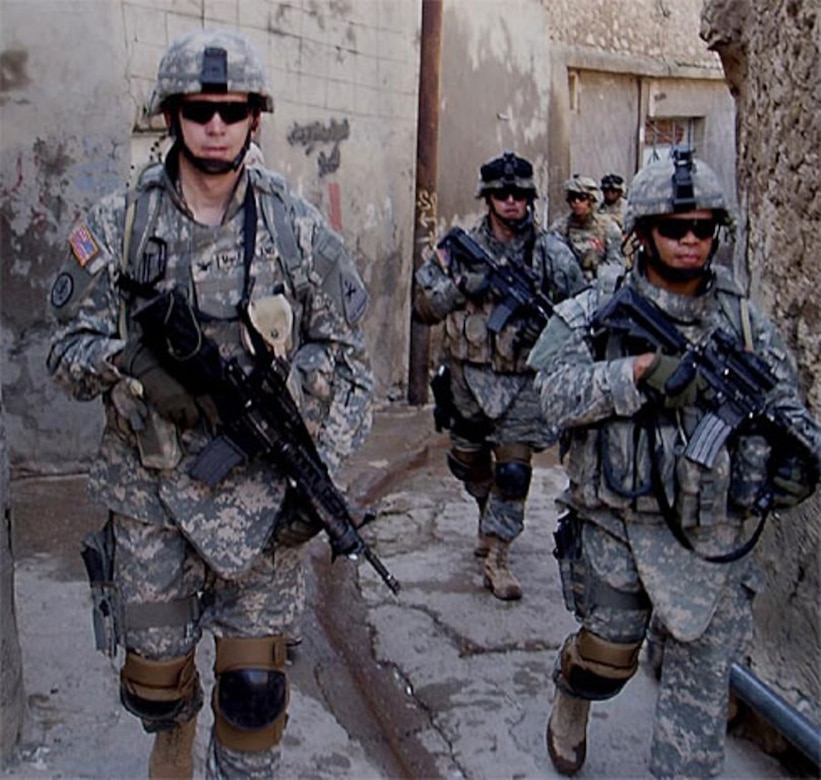
After hanging up his gloves, Anyabwile committed to soldiering as an infantryman, he said. He then focused on his next fight — becoming an Infantry officer. "I wanted to be more than an NCO. I wanted a seat at the table to make decisions to help soldiers."
As an NCO, then-Staff Sgt. Anyabwile said he hoped to shape the lives of more soldiers on a larger scale within the officer corps.
Because of his South Central roots, he had to overcome his own personal misbeliefs. "I always thought that [becoming] an officer was this high bar, and, because of the stock that I came from, there's no way that I could get selected," he said.
That personal bout ended in 1999 after he was selected for officer candidate school. A born fighter, it came naturally for the freshly-pinned second lieutenant to join the infantry, he said.
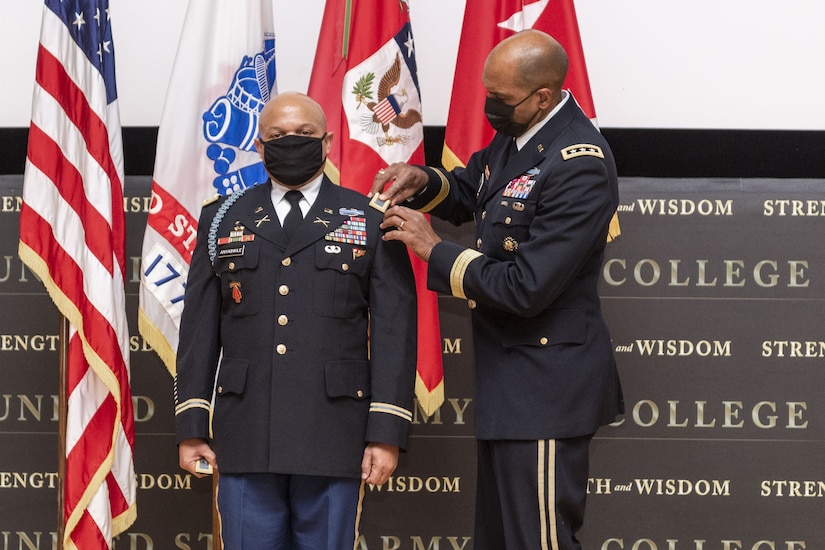
Since then, he's moved through the ranks to where he is today, serving as director of the Strategic Simulations Division at the U.S. Army War College.
Along the way, Anyabwile has held onto an appreciation for his mentors. From the recruiter he met as a troubled teenager to Army leaders at the highest ranks.
"I have known Okera for 20 years. He is a focused, dedicated and caring leader with an amazing life story, and I was honored to promote him to the rank of colonel," said Lt. Gen. Gary Brito, Army deputy chief of staff for personnel.
"Obstacles can be breached and dreams can be achieved. Okera's journey highlights the amazing opportunities that our Army can offer to citizens with the drive, desire and passion to serve," he added.
Anyabwile, who's finishing his third master's degree, credited Brito for being his longest-serving mentor. "When I commissioned and showed up at my first duty station [as an officer], he was a battalion operations commander," he said. "He was a great mentor, great coach, and it set the tone for me moving forward."
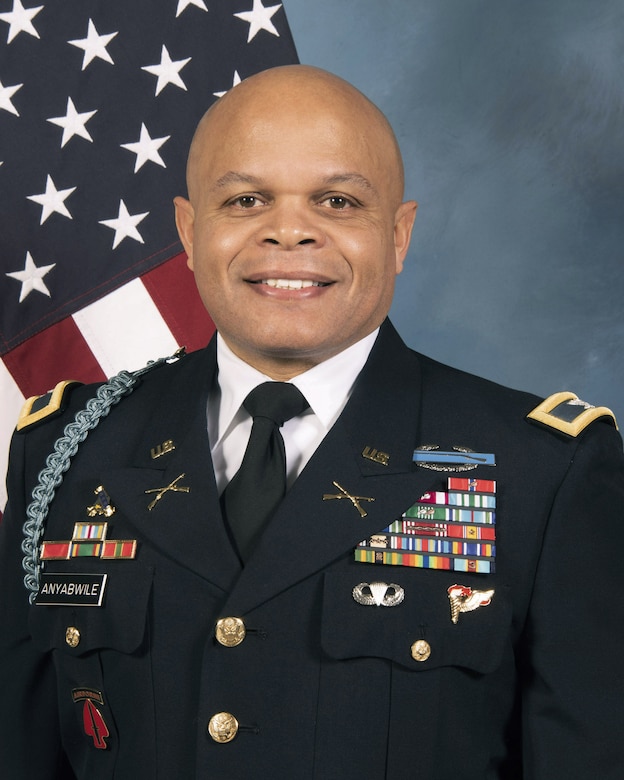
In the past 35 years, South Central moved on without him and many of his peers, Anyabwile said.
"Life in the inner city goes on," he said. "It's like when someone goes off to prison or gets killed, there's not a lot of memories of that person anymore." However, Anyabwile has not forgotten his peers, the opportunities he was given by the Army, or his old neighborhood.
"I look back and ask, 'What if someone [like Johnson] would have shown the same type of concern or given the same opportunities to many of my peers who were in the same boat as me?'" he said.
"If my peers in the inner city of Los Angeles had the same opportunities as me, I think many of them would have been just as successful, if not more [successful] than myself," he said.
Part of Anyabwile feels his continued service helps pay forward a debt owed to a recruiter who believed in him and maybe saved his life.
"I really do believe that if more people, whether in the inner city or rural, are given an opportunity, they will succeed," he said. "I'm a living testimony to that."
May 18, 2021
Pentagon Press Secretary John Kirby provided the following readout:
Secretary of Defense Lloyd J. Austin III spoke today with Israeli Minister of Defense Benjamin “Benny” Gantz. Secretary Austin reiterated the United States’ unwavering support for Israel’s right to defend itself and to protect Israeli civilians, and lamented the loss of innocent Israeli and Palestinian lives. He expressed his support for de-escalation of the conflict and the restoration of calm.